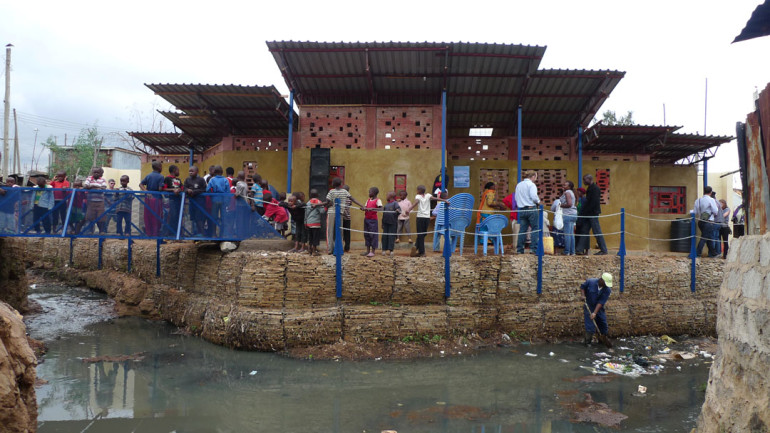BRCK at the Bottom of the Pyramid
BRCK’s founding team has a long history of making an impact – from Ushahidi to the iHub. BRCK is of the same ethos as these other ventures, but a different business model. BRCK is a for-profit company. The founding team might not have realized it at the outset – but they’re not the only Kenyans who feel confident that the BRCK’s for-profit model will make them money.
The Usalama Bridge Youth Reform group, based in Kibera, is banking on the BRCK to help them generate funds to open a cyber café through a collaboration with the Kounkuey Design Initiative (KDI).
KDI is a non-profit organization that works with underserved communities by collaborating with residents to design and transform public spaces. At each site, KDI partners with community groups who propose concepts for the buildings.

At one of KDI’s recent project sites, the Usalama youth group proposed building a cyber café. Their pitch was accepted, and the final project will feature space for a cyber café in addition to a sanitation block, a small playground and a daycare center.
The cyber café business model will be tested through a partnership with BRCK. KDI and the Usalama youth group will receive a BRCK on loan for six months to see if they can make money by selling internet services in Kibera.
The project is also backed by the youth themselves. The Usalama group started a savings and loan group in August of 2013, and has collected over 42,000 shillings, some of which will be used to launch the business.
Through research and hustle, the Usalama youth have gathered insights about the current cyber cafés in their neighborhood and their potential business strategy. According to Usalama:
- No one is using a modem or a fiber connection in Kibera.
- Most cyber cafes spend 3,000 to 5,000 shillings a month for data, but Usalama is weighing the risk of buying a 10,000 shilling bundle to get the cost per-MB at a less expensive price.
- Cyber cafes also typically forbid downloading movies and music. Usalama knows that these types of downloads, while requiring a lot of data, can help start other businesses by copying and reselling the movie and music files on DVDs.
While the dream of the Usalama members is brick and mortar cyber café, the start-up costs of acquiring computers and desks are quite high. “We need to start somewhere,” says Pascal, one of the leaders of the Usalama. To test their idea, Usalama is going to experiment with buying data and selling internet access through the BRCK where groups already gather – like schools, restaurants and sporting matches. They are also interested in planning their own events and providing internet access to attendees. “We cannot wait for the customers to come,” Pascal says.
*KDI is assisting with interior design of the cyber café, helping get cost evaluations for the build and acquiring laptops and desks through fundraising and partnerships. If you would like to contribute, please get in touch with KDI directly at [email protected].
Meghan Lazier is a summer UX fellow with BRCK. She is currently a graduate student at School of Visual Arts in the MFA Design for Social Innovation program.